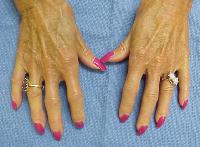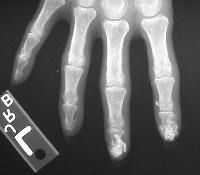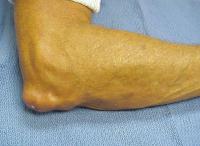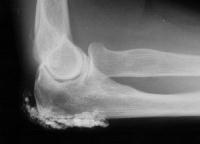| Scleroderma is a systemic disease, but commonly affects the hands in several ways. Finger stiffness is typical. Scleroderma may be associated with other syndromes, and a common combination is Calcinosis, Raynaud's, Esophageal motility disorders, Scleroderma and Telangiectasias - CREST syndrome. In this syndrome, the hands are affected by calcinosis, Raynaud's and scleroderma. Skin ulcerations may arise from Raynaud's related peripheral vascular insufficiency (fingertips), from scleroderma related skin tightness (extensor surfaces of the proximal interphalangeal or metacarpophalangeal joints), or from extrusion of subcutaneous calcium formations (any location). |
| Click on each image for a larger picture |
| Tightness of skin is apparent over the dorsal fingers, with loss of extensor skin creases. |
 |
| The right index and middle fingertips are large, hard and tender. |
 |
| Xrays show extensive soft tissue calcifications of the distal pulp of these fingers. |
 |
| Healing ulcerations on the left index and middle fingertips, where calcium deposits have spontaneously drained in the past. |
 |
 |
 |
| Subcutaneous calcification of the extensor surface of the elbow is common, and a common site for spontaneous drainage and infection. |
 |
 |
| Isolated involvement around the flexor carpi ulnaris at the level of the wrist. |
 |
| Search for...
scleroderma hand surgery finger subcutaneous calcification crest hand surgery |
Case Examples Index Page | e-Hand Home |